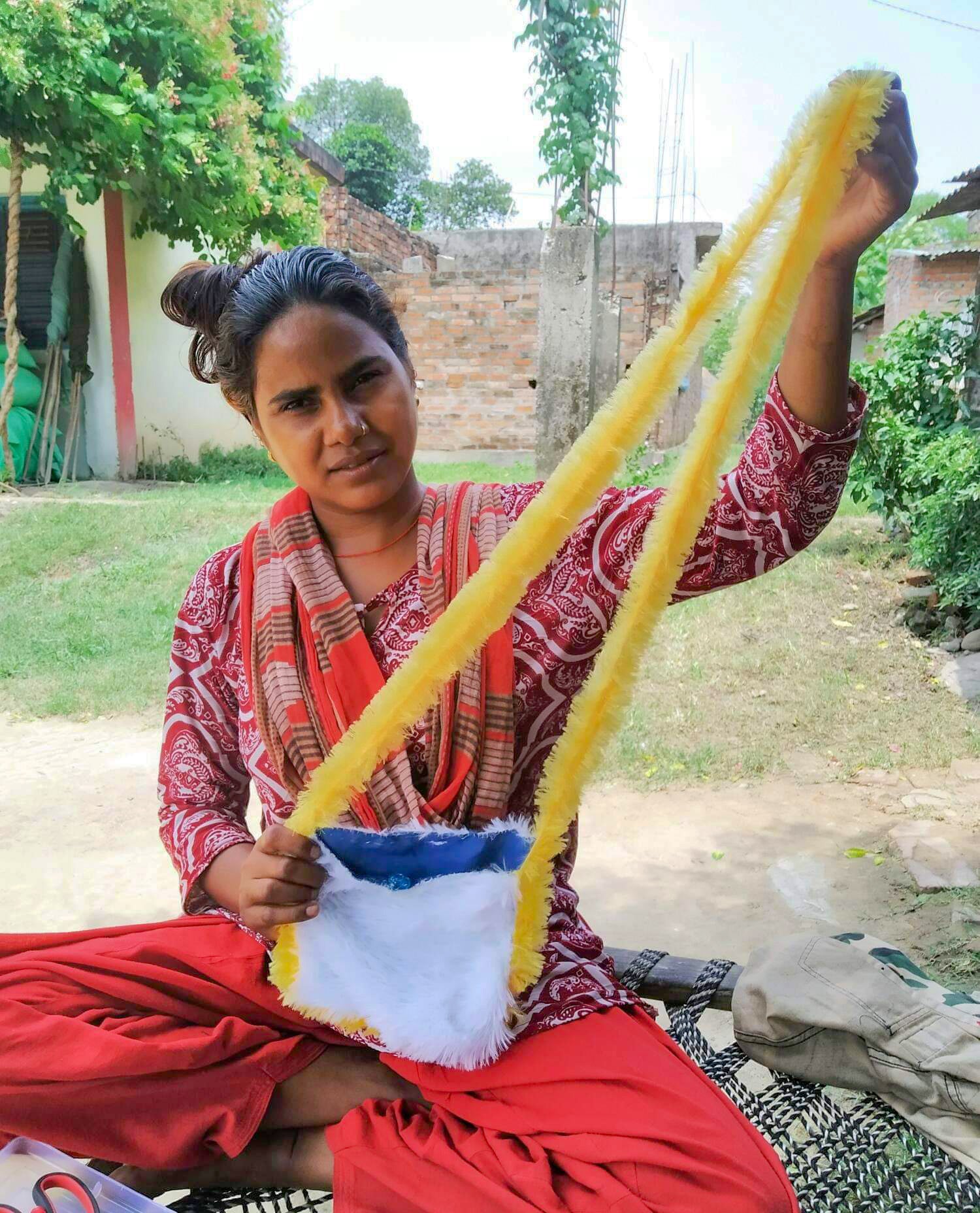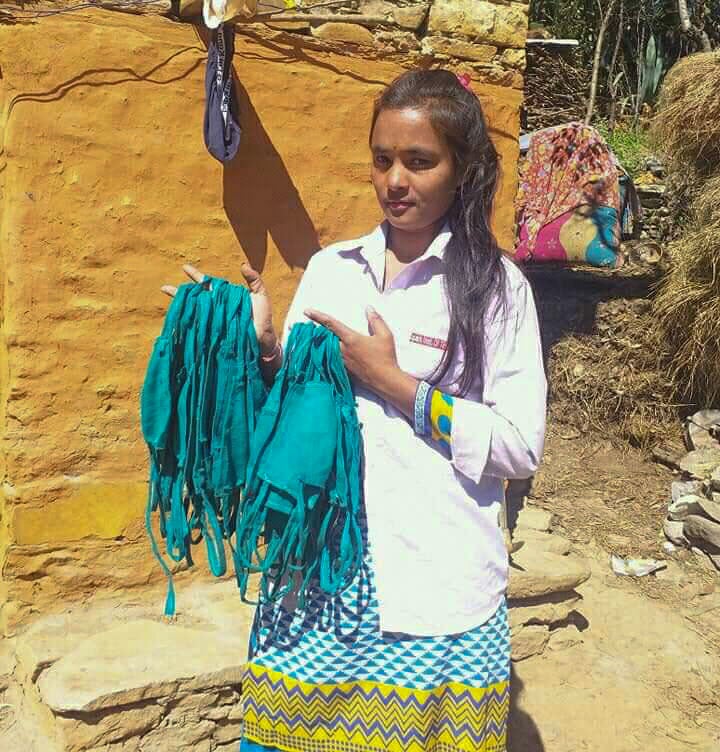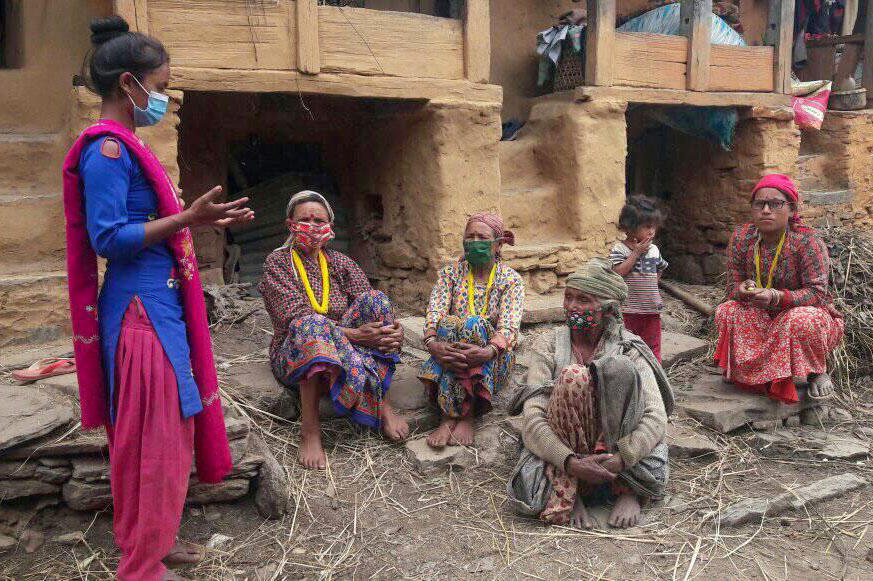Exposed to poverty, poor infrastructure and damaging notions that girls are less valuable than boys, many girls in rural Nepal accept these conditions as fate.
But increasingly, others refuse to let challenging circumstances stand in their way.
Together, a growing set of adolescent girls and young women in Nepal are paving the way, putting school first and resisting traditional practices that harm their well-being. They want each girl in their communities to know that she is important. She counts.
Their courage proves that girls have choices—and a voice.
And now, in the midst of the ruthless COVID-19 pandemic forcing already impoverished people into dire situations, adolescent girls are putting community needs first, demonstrating their worth.
Here are their stories.
From school dropout to pathfinder

In southern Nepal’s Kapilvastu district, situated along the border with India, Bidhya Sahani had to leave school after the seventh grade.
Her family was struggling financially and needed more help with household chores.
Little did she know, her parents had other plans for her, too.
Dropping out of school is common among rural communities in Nepal, mostly for financial reasons. Child marriage—also driven by economic hardships as well as cultural norms—is another reason parents cut girls’ education short.
Disappointed, Bidhya never imagined she would embark on her educational journey again.
But the following year, in 2015, a chance to participate in a programme called Rupantaran, or “transformation” in Nepali, changed that.
Rupantaran classes taught Bidhya about the social issues she may face, like child marriage, gender-based violence and caste-based discrimination. She also learnt how to handle them.
Led by the Department of Women and Children with support from the UNFPA-UNICEF Global Programme to End Child Marriage, Rupantaran is a lifeline for adolescent girls like Bidhya across Nepal.
The programme engages girls at high risk of early and forced marriage and other obstacles that could dissolve their ability to reach their full potential.
Especially at risk are girls out-of-school and those who live in disadvantaged districts. Through clubs for adolescent girls, Rupantaran aims to strengthen skills in areas they need to thrive in life, such as financial management. Rupantaran also encourages girls to stand up for their rights and resist harmful practices, such as child marriage.
“Rupantaran was a turning point in my life,” Bidhya explains. “I was determined to continue school.”
After insisting for weeks, her parents finally allowed her to re-join eighth grade. But the way ahead was still not clear. Her parents were set to marry her off.
“When I discovered my parents’ plan to marry me off, I protested and was able to stop it,” she recalls.
That was just the beginning for Bidhya, who is now pursuing a Bachelor’s degree in education.
She and fellow participants in the Rupantaran programme formed an Adolescent Girls’ Group. Together, they launched a campaign in their community to stop child marriage and convince parents to send their daughters to school.
“So far 20 girls who previously dropped out of school have gone back because we counselled their parents,” she proudly shares. “I am determined to work for vulnerable girls like me who are forcibly married at an early age and thus deprived of education.”
The Adolescent Girls’ Group encourages parents to register their children’s birth at the local ward office, and they check the birth certificates of local adolescent girls who are getting married to ensure they are at least 20 years of age. They also help underprivileged children continue their education by negotiating scholarships with the school.
During the COVID-19 outbreak, which halted its regular activities, the Adolescent Girls’ Group began educating community members about how to stop the spread of coronavirus.
“Women and girls are living in fear due to false information and rumours, so we visit neighbours’ houses and provide them with the right information about COVID-19 while maintaining social distance,” Bidhya describes.
Once a young girl forced to leave school, Bidhya has transformed her life. She uses her voice to stand up for her rights—and now she’s among a cadre of young women inspiring others to do the same.
A young woman leading the fight against COVID-19 and harmful practices

After the local public school was turned into a quarantine centre in the remote Bajhang district of far-western Nepal, Shilpa Sunar took up a new job.
Shilpa is a peer facilitator of Rupantaran classes in her community, which were halted by the COVID-19 lockdown.
But now, she provides emotional support to women and adolescent girls who are stressed because of the current restrictions and disruption of studies, including 40 girls from the local Adolescent Girls’ Circle.
Shilpa shares tips for maintaining menstruation hygiene, and recently she distributed UNFPA-supported Dignity Kits with sanitary products to girls and women living in quarantine centres.
“I had a traumatic experience associated with menstruation,” she confides. “Hence I am determined to fight against menstrual taboos.”
In rural Nepal, menstruating women and girls are often considered impure and frequently banished to isolated outdoor sheds or huts.
This harmful and discriminatory practice, known as chhaupadi, controls females’ bodies against their will and puts them at risk of diarrhoea and dehydration, hypothermia (many have lost their lives in freezing huts overnight) and urinary tract infections, gender-based violence and other hazards.
While such beliefs are slowly fading in Bajhang district, they remain a challenge in the vicinity and elsewhere.
Through the Rupantaran classes and Adolescent Girls’ Circle outreach, Shilpa discusses the consequences of harmful practices, especially chhaupadi and child marriage, which are grounded in gender inequality. She also enhances sexual and reproductive health knowledge and emphasises the necessity of education.
Perhaps one of the most important accomplishments of her work—Shilpa played a crucial role in facilitating a declaration by the local Majhi Village Development Committee to abolish child marriage and chhaupadi.
She has facilitated 52 weeks of Rupantaran classes for six Adolescent Girls’ Circles, helping 180 girls shape their futures.
Initially, most parents hesitated to let their daughters participate in the programme, but now they approach her for consultations.
“As a graduate student in college, I am more confident than ever in my fight against traditionally harmful practices,” she beams. “I am hopeful that we can eliminate them one day.”


